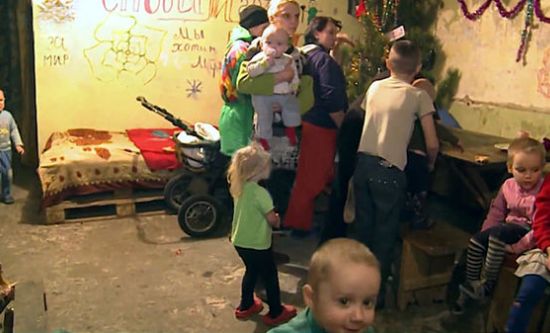
To justify the ongoing expensive and bloody war on the Donbass (south east Ukraine) and aggression towards Russia, the Ukrainian ruling class and its imperialist backers have taken to rewriting history. On New Year’s Day almost 4,000 people rallied in Kiev to celebrate Nazi collaborator Stepan Bandera as a ‘national hero’; in his 8 January speech in Berlin, Ukrainian Prime Minister Arseniy Yatsenyuk recast Nazi Germany as the victim of ‘Soviet invasion’ in the Second World War. So too do they fictionalise the present. Rejecting a Russian plan for the removal of heavy artillery from eastern Ukraine, at 6am on 18 January Kiev’s pretences to a ‘ceasefire’ collapsed, as it resumed massive shelling of the People’s Republic of Donetsk. Kiev’s strategy has cost more than 5,000 lives and involved the use of cluster bombs, missiles and aerial bombs on towns and villages in the Donbass. Justification is sought in an ‘anti-terror operation’ against alleged ‘Russian aggression’, yet after a year of conflict there remains no solid evidence for Russian military operations whatsoever. The imperialist countries remain silent on Kiev’s atrocities, instead offering it financial and military support. In view of such behaviour, Russian President Putin is correct to describe Kiev’s troops as a ‘NATO legion’.
By late January 2015 fighting between Ukraine state forces and their opponents had intensified and was focused on strategic economic locations; an airport, steel mills, power plants, railway hubs and Mariupol sea port.
While Donetsk weathers shells, the Russian economy suffers under sanctions, aggravated by falling oil prices. On 26 January, Standard & Poor’s downgraded Russia’s sovereign credit rating to junk status. Shockwaves have rippled outwards into Eastern Europe and Central Asia, where nine countries, including Ukraine, that are heavily reliant on remittances from Russia, stand to lose more than $10bn in 2015. Such shocks will worsen Ukraine’s economic collapse. It faces a $15bn budget gap, despite passing a swingeing austerity budget on 29 December 2014; current plans will see 10% of public employees laid off, the part-privatisation of health care and education, and the abolition of subsidies and price controls. No such cuts have been made to military spending, which will grow to at least 3% of GDP in 2015 and 5% by 2020. To plug the gap the US Treasury has pledged an additional $1bn loan to Kiev. This will mean little if Russia demands the early repayment of its $3bn loan to Ukraine, which continues to violate the terms of the loan agreement.
Conscious that Russia’s crisis will soon be felt in Western Europe, French President Hollande said that ‘sanctions must stop now’; under the pressure of existing measures France has been forced to postpone a €1.2bn Russian deal for two helicopter carriers. Thus far the EU remains committed to its sanctions policy. How much longer will it remain so?
Jack Edwards
Fight Racism! Fight Imperialism! 243 February/March 2015




